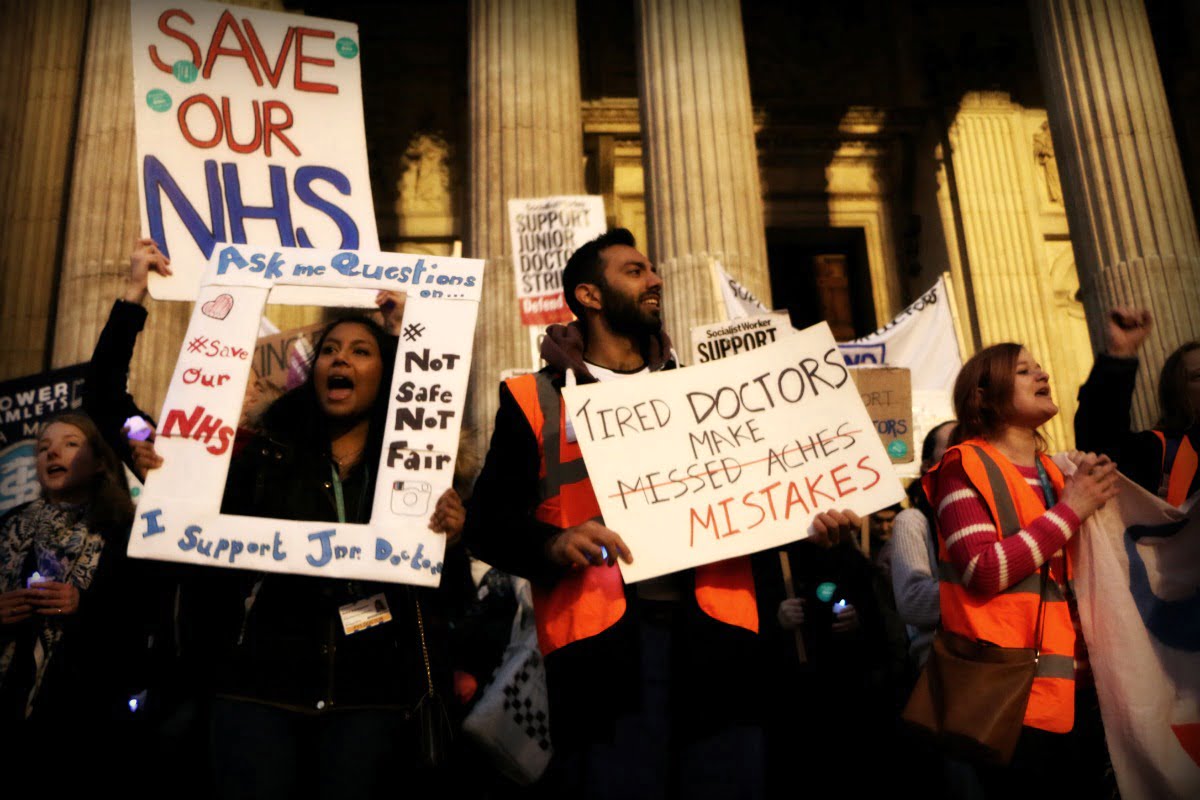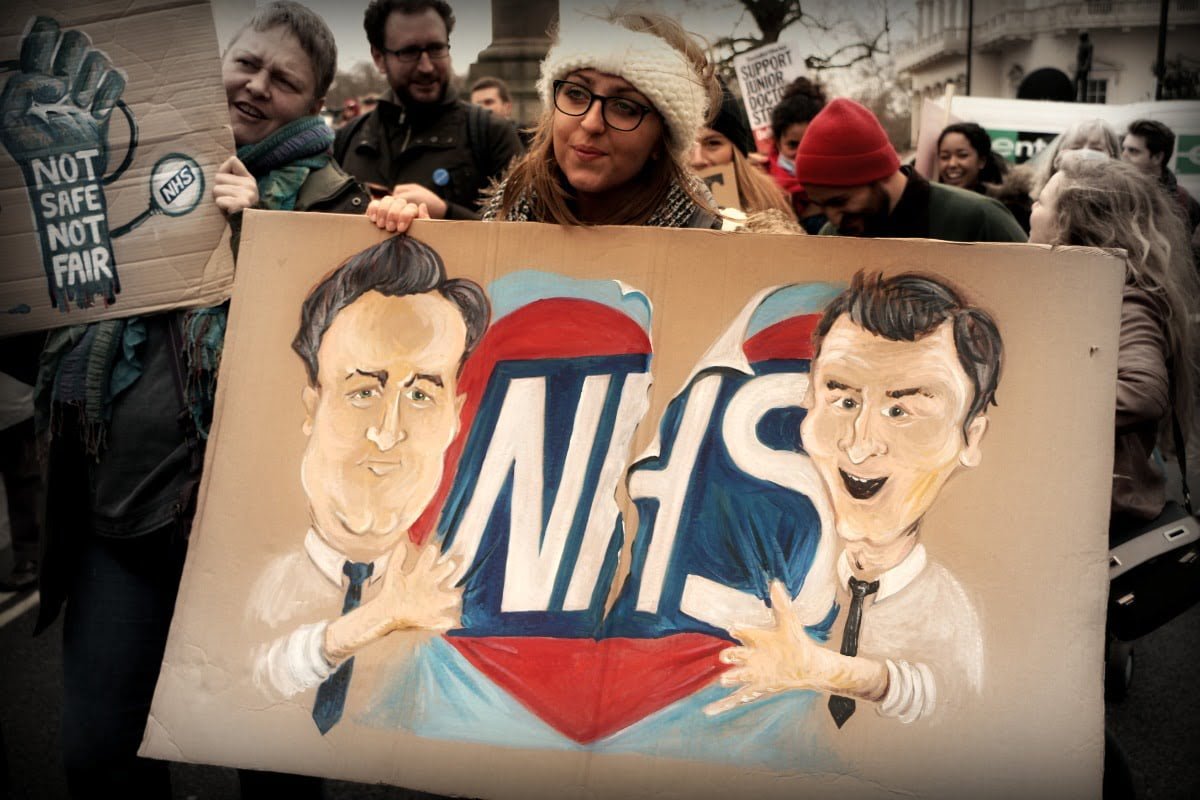This week, England’s junior doctors will undertake industrial action for the fifth time this year. In contrast to strike action taken earlier this year, this time a full withdrawal of labour will occur between 8am and 5pm on Tuesday 26th and Wednesday 27th April. Tomasz Pierscionek, a junior doctor in London, discusses the latest action being taken by medics and points out the way forward in the fight to defend the NHS.
This week, England’s junior doctors will undertake industrial action for the fifth time this year. In contrast to strike action taken earlier this year, this time a full withdrawal of labour will occur between 8am and 5pm on Tuesday 26th and Wednesday 27th April. Withdrawing our labour entirely for two days is an action most of us did not wish to take. However, as Jeremy Hunt’s obstinacy and refusal to negotiate with the BMA seems unrelenting, our union has been forced to respond.
Contrary, to the propaganda seen in some media outlets, these strike actions are very unlikely to lead to patients being harmed. There are several reasons for this. Firstly, though many of us will be outside our respective hospitals on the picket lines, our colleagues such as consultants and staff grade doctors (a category of doctors below consultant but not classed as junior doctor) will be manning the fort.
Secondly, there is an unwritten agreement that in the event of an emergency, such as a major accident or terror attack, junior doctors would leave the picket lines and return to their posts. Although the media focus on routine clinics and operations that will be cancelled as a result of the strike, they omit to mention that such an outcome would also be the hallmark of an underfunded NHS. In the case of privatisation and further efficiency savings, as being pushed by the Tory government, some cancellations may be permanent.
While public support remains on our side and solidarity from fellow unions continues growing, the pressure on Jeremy Hunt, the Tory Health Secretary increases. His parliamentary colleagues are now claiming that he may have misled the House. It has emerged that Hunt may not actually have the power to use the “nuclear option” to impose the contract as he has been threatening. A five page letter from the Government Legal Department from mid-April stated that the Secretary of State shall “proceed with the introduction of a new contract” and is entitled to do so, though the word “imposition”, is not mentioned. This may seem like a subtle point, but the choice of language is interesting and has led some, including ministers such as Heidi Alexander, the Shadow Health Secretary and Norman Lamb, a Liberal Democrat health minister under Hunt until last May, to question this reversal in language and even to ask whether Hunt is able to impose the contract at all.
At the same time, five doctors have gone to the High Court to request a judicial review in order to determine whether Hunt is legally able to introduce the new contract. Furthermore, doctors have taken the fight directly to Jeremy Hunt’s doorstep. Earlier this month, two medics started a protest outside the Department of Health with a plan to maintain a permanent presence outside the building until Hunt comes out to negotiate. There has been a constant turnover of doctors sitting and sleeping outside the building in 12 hour shifts and it has been said that there are enough volunteers ready to maintain the vigil for at least the next few weeks. Even members of Hunt’s own party are concerned, noting that an equality impact assessment performed by Hunt’s own department revealed the new contract would discriminate against doctors working part time and those who are single parents, the majority of whom are women.
The very suggestion of doctors taking industrial action seemed unlikely a year ago. The BMA was not the sort of union one could imagine permitting a strike, let alone organising industrial action five times in four months. The fact that they took strike action for the first time in 40 years – the first time in the career of almost any doctor working today – was unprecedented, as was the swiftness with which doctors mobilised and became quickly politicised.
Since then, doctors have made links with student nurses and teachers in their respective struggles, whilst receiving solidarity from across the unions and the wider labour movement. Doctors have made their presence felt in the media, as well as at protests and demonstrations, such as the national demonstration organised by the People’s Assembly in London on the 16th April. They have exposed government spin regarding the claims about the extra deaths occurring at weekends, and have emerged as one of the groups at the forefront of the struggle against austerity.
Indeed, even the mainstream media – a reliable mouthpiece for the Establishment – have noted the inspirational example that the junior doctors struggle has set for other workers who are looking to fight back against the Tories and their programme of cuts. For this reason, as the BBC commented in a recent article, “a government source ruled out any compromise [with the junior doctors]”, because “BMA leaders had radicalised a ‘generation of junior doctors’…and if the government backed down, it would face similar industrial action by other unions, which were watching this dispute ‘like a hawk’.”
The BBC’s “government source” is correct: a generation of junior doctors has been radicalised, and workers and youth across the movement are gaining confidence from the determination and militancy being shown by the medics. The sentiment will be: if the junior doctors can organise and fight back, then why can’t we?! The task now is for the leaders of the labour movement to turn this sentiment that exists into a generalised struggle designed to kick out the Tories and end austerity.
Many of our colleagues are now understanding that our struggle does not exist in isolation but is only one reflection of the impasse of the capitalist system. They are gaining a greater awareness about the nature and context of our struggle, and how this fits in relation to austerity, the future of the NHS, and the wider crisis of capitalism. The BMA must build upon and strengthen its links with other unions and the TUC and create a national movement for the defence of the NHS, as part of a socialist programme, to ensure a better future for all.







